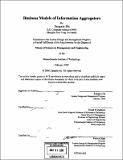Business models of information aggregators
Author(s)
Hu, Jiangxia, S.M. Massachusetts Institute of Technology
DownloadFull printable version (40.12Mb)
Other Contributors
System Design and Management Program.
Advisor
Stuart E. Madnick.
Terms of use
Metadata
Show full item recordAbstract
This thesis identifies the specific characteristics of information aggregators, and proposes nine business models appropriate for information aggregators. These nine models are: advertising, brokerage, subscription, licensing, infomediary (information intermediaries), referral/click-through, customized/personalized service, professional service/consulting, and application service provider. The thesis then looks into various companies who base their businesses on information aggregation and analyzes the development of their business models in the context of competition. The financial and social performances of these companies are studied and reasons are explored. In the end, the thesis summarizes findings from case studies, lists the widely used business models and the rarely used ones, and explores reasons for this phenomenon. The conclusion of this research is that information aggregation is a start point for a company to develop differentiated product or services. Companies can develop into an independent information aggregators; they can use information aggregation as a platform; they can partner with aggregatees or customers to provide customized information. Eventually, many will be integrated into end-to-end solutions, or penetrate into traditional businesses by leveraging information aggregation. The research can be used by companies who develop information aggregation products or services. It can also be used to evaluate the viability of information aggregation initiatives.
Description
Thesis (S.M.)--Massachusetts Institute of Technology, System Design and Management Program, 2008. Includes bibliographical references.
Date issued
2008Department
System Design and Management Program.Publisher
Massachusetts Institute of Technology
Keywords
System Design and Management Program.